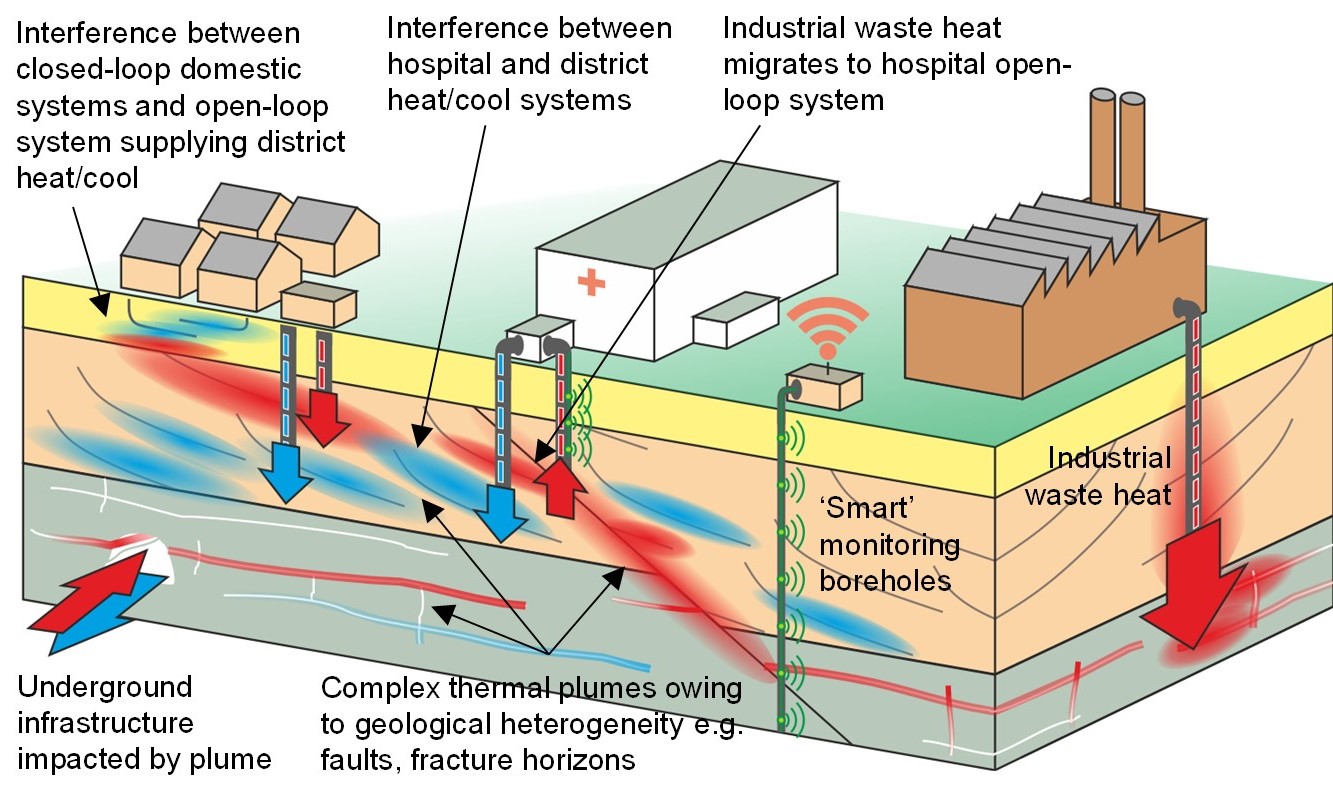A collaborative research project between Imperial College London, the British Geological Survey, the University of Leeds and the University of Manchester
Smart assessment, management and optimisation of urban geothermal resources (SmartRes)
The UK uses around 50 GW of energy to heat and cool buildings with only 6% from renewable sources. Widespread exploitation of urban geothermal resources could deliver a significant component and, in some cases, all of this energy demand, contributing to UK self-sufficiency and energy security. Geothermal resources offer natural heat energy, large-scale seasonal energy storage, cooling as well as heating, and a steady, low carbon energy supply. However, uptake is impeded by concerns over storage and production capacity, sustainability, scalability, environmental impact and resource management, especially in the case of adjacent multiple installations at city scale. The risks associated with these factors lead to higher costs which, along with a lack of visibility among stakeholders, leads to continued use of higher carbon alternatives.

Complex heat distribution and transport through heterogeneous aquifers with matrix and fracture flow, interference between thermal plumes and strategies for geothermal monitoring.
The broad aim of the SmartRes project is to overcome technical, economic and societal barriers to large-scale deployment of urban geothermal technologies in the UK and other immature markets, by providing key data, knowledge and recommendations targeted at
- Industry, to raise awareness and reduce perceived technical and economic risks
- Government, to guide policy and stimulate uptake
- Regulatory authorities, to inform a fit-for-purpose regulatory framework
SmartRes is a collaborative, multi-disciplinary project, involving researchers from the Department of Earth Science and Engineering, the Department of Civil and Environmental Engineering and the Centre for Environmental Policy at Imperial College London; the British Geological Survey, the School of Earth and Environment and the School of Civil Engineering at the University of Leeds, and the Department of Earth and Environmental Sciences at the University of Manchester.
Our research focusses on two case study locations for the deployment of urban geothermal technologies: Manchester and London. The case studies were chosen because they have different levels of uptake of geothermal technology, and have contrasting geology that is exploited by shallow geothermal technologies. The case studies are supported by field experiments at locations in Cheshire and Berkshire. The Cheshire experiments make use of the UK GeoEnergy Observatory Cheshire, a world-leading facility for experimental research in shallow geothermal. The Berkshire experiments make use of a network of boreholes installed on land owned by the Eling Estate.
SMARTRES links
Project partners
SMARTRES is supported by eleven project partners who serve on the project Advisory Board, supply expert advice and guidance, provide key data, and provide a route to disseminate results direct to stakeholders.
- The UK Department of Energy Security and Net Zero (DESNZ) develops national and local policy pertaining to low carbon heating and cooling technology
- The Northern Irish Department for the Economy (DfE) leads on energy policy in Northern Ireland
- The Energy Innovation Agency supports local energy policy in Greater Manchester
- The City of London Corporation leads on local energy policy
- The UK Environment Agency develops and applies the regulatory framework for shallow geothermal
- Mott MacDonald leads commercial development of shallow geothermal in the UK and internationally
- ARUP leads commercial development of shallow geothermal in the UK and internationally
- IFTech installs shallow geothermal in the UK and internationally
- EON Next Energy operates shallow geothermal installations in the UK
- The UK Ground Source Heat Pump Association (GSHPA) informs policy and uses results to improve best practice and update relevant code(s)
- The Eling Estate hosts one of our experimental test sites in Berkshire
Funding
SMARTRES is funded by the UK Natural Environment Research Council (NERC; grant number NE/X005607/1/1). SMARTRES was funded as one of a number of Highlight Topics.
News
We are pleased to announce our upcoming progress meeting on 23rd and 24th September 2024. If you are a local or national governmental agency, or a commercial supplier or operator of shallow geothermal systems, and would like to join the project as a partner, please contact the project lead, Prof. Matthew Jackson (m.d.jackson@imperial.ac.uk).
